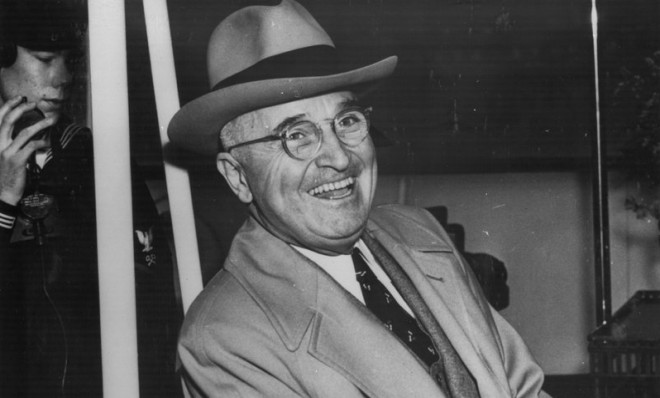Today in history: The Nazis surrender
In 1945, President Truman announced Victory in Europe (V-E) Day

A free daily email with the biggest news stories of the day – and the best features from TheWeek.com
You are now subscribed
Your newsletter sign-up was successful

May 8, 1884: Harry Truman was born. He was the 33rd president, serving between 1945 and 1953. Truman became president when Franklin D. Roosevelt died. He retired with low approval ratings, but today is regarded as a great president. He ordered the atomic bombing of Japan, oversaw the Marshall Plan, Berlin Airlift, Korean War, and the creation of NATO.
Each morning, Truman went on a brisk walk around Washington — unthinkable today — and played poker with White House reporters. He once threatened to punch a Washington Post reporter in the nose for writing a bad review about his daughter's singing. He was the last president without a college degree.
May 8, 1945: Quite a 61st birthday for President Truman. In a national radio broadcast, he announced the surrender of Nazi Germany — victory in Europe (V-E) Day.
The Week
Escape your echo chamber. Get the facts behind the news, plus analysis from multiple perspectives.

Sign up for The Week's Free Newsletters
From our morning news briefing to a weekly Good News Newsletter, get the best of The Week delivered directly to your inbox.
From our morning news briefing to a weekly Good News Newsletter, get the best of The Week delivered directly to your inbox.
May 8, 1972: President Nixon said the U.S. would mine North Vietnamese ports to stem the flow of weapons to that communist nation.
Quote of the day
"Intense feeling too often obscures the truth." —Harry Truman
More from West Wing Reports...
A free daily email with the biggest news stories of the day – and the best features from TheWeek.com
-
 The problem with diagnosing profound autism
The problem with diagnosing profound autismThe Explainer Experts are reconsidering the idea of autism as a spectrum, which could impact diagnoses and policy making for the condition
-
 What to know before filing your own taxes for the first time
What to know before filing your own taxes for the first timethe explainer Tackle this financial milestone with confidence
-
 The biggest box office flops of the 21st century
The biggest box office flops of the 21st centuryin depth Unnecessary remakes and turgid, expensive CGI-fests highlight this list of these most notorious box-office losers